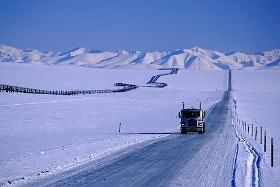Rookie Drivers And Pay (saving $$)
Topic 6402 | Page 1

Daniel B. made an excellent thread detailing his entire first year's takehome, paycheck by paycheck. Read it here: First Year's Salary
That should put you in the ballpark of what you'll make, as well as allow you to get a glimpse of how volatile individual paychecks can be. However, if you do not have a lot of expenses at home, you should be able to comfortably live on the road as well as save up some money.
Francisco, most of my career I lived in the truck. I didn't have a home or vehicle. I just stayed with family and friends in various places when vacation time came around. I was able to save quite a bit of money that way - about $1,200 a month or so. You won't be able to do that your first year, especially in the first few months. You'll likely make just enough to squeak by. But as time goes on you'll be able to put money away.
You can probably expect about $32,000 - $36,000 your first year, about $40,000 your second year, and it will top out in the $50,000 range somewhere between years 3 and 5. Those are generally safe numbers. There are a small percentage of drivers doing better than that. If you really dig around and research what's out there you can do better. But those are numbers you can pretty much count on.
Ideally you'd like to have $500-$1,000 saved up for the beginning of truck driving school. That will allow you to feed yourself and have a little left over until those paychecks start coming in.
HOS:
Hours Of Service
HOS refers to the logbook hours of service regulations.Danial B's post that was linked above is a very well written topic.
The best thing I can suggest is sit down and make a list of what you need a to pay each month including food. if you have a spouse that works, its a plus. Your training will probably pay 400/week.
What I do with my wife is, what she makes goes to food and I pay the bills as I make more than she does. Each week our bank automatically transfers $75 from our checking to savings. Lately i've been putting more in. Each week I pay a bill or two, and at the end of the week, whatever is left in the checking I put half in savings.. If i didnt need it then, I don't need it now. it works. If I have 200 left in the bank the day before pay day, I'll send 100 to savings the night before. You'd be amazed how fast you save.
Some weeks you'll do good and others bad. One thing I did was took the total months expense and divided it by my milage pay. Gives me an idea of what I need to run a month.

Thanks for chipping in on this info. I'll read that article soon because it's info I've been wondering about.
New Reply:
New! Check out our help videos for a better understanding of our forum features

















Preview:
This topic has the following tags:
Truck Driver Salary Truck Driving Lifestyle







 TT On Facebook
TT On Facebook
Hey there! Ok, so I am trying to get as much knowledge of peoples experiences as a driver to know what my expectations should be when I start out. Coming from a family who never really had money, and although I have been working for the past few years (21 years old) I never really saved my money due to paying my own expenses ontop of helping the family out. Now that I have had a job lately thats been paying decently, I managed to save a couple thousand to put towards cdl school. After working hard saving my money, investing in school, I will be back at point A, no real savings. Therefore, my question to you guys is it possible for rookie drivers to make enough to support life on the road while saving? I know in this industry (as with any, really) you get paid better as you gain more and more experience. Essentially I want an idea of how much youd make as a rookie (with average miles and CPM) and your guys experience on budgeting and how, if able, you guys had savings put aside. Thank you in advance for words of wisdom!!! One love.
CDL:
Commercial Driver's License (CDL)
A CDL is required to drive any of the following vehicles:
CPM:
Cents Per Mile
Drivers are often paid by the mile and it's given in cents per mile, or cpm.